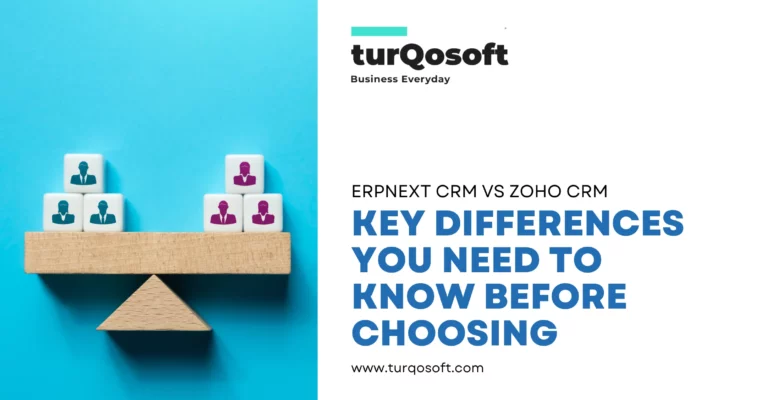ERPNext CRM vs Zoho CRM: Key Differences You Need to Know Before Choosing

ERPNext CRM vs Zoho CRM: Key Differences You Need to Know Before Choosing
Choosing the right CRM software can be a game changer for any business, helping manage customer relationships, streamline workflows, and boost sales. Two popular CRM systems that often come up in discussions are ERPNext CRM and Zoho CRM. Both platforms offer robust features, but they cater to slightly different business needs.
ERPNext CRM vs Zoho CRM

In this comparison, we’ll explore the unique strengths of each platform, how they stack up against each other, and which one could be the right fit for your business.
Discover the key differences between ERPNext CRM and Zoho CRM to make the right choice for your business. Compare features, pricing, and more!
ERPNext CRM: All-in-One for Businesses Needing ERP Integration
ERPNext is an open-source platform offering not just CRM capabilities but also a full-fledged ERP system. For businesses looking for a unified solution that integrates customer management with accounting, inventory, HR, and more, ERPNext CRM is an ideal choice.
Key advantages of ERPNext CRM include:
- Full ERP Integration: ERPNext seamlessly integrates CRM with other ERP modules like accounting, manufacturing, and inventory. This is especially useful for businesses that need to manage complex workflows across multiple departments.
- Open-Source Flexibility: Being open-source, ERPNext gives businesses the freedom to customize and modify the system to fit their exact needs. This makes it a great option for companies that require flexibility.
- Industry-Specific Solutions: ERPNext CRM works well for industries with specialized needs, such as manufacturing, retail, and distribution, where the CRM’s integration with other modules like inventory is vital.
- Cost-Effective: As an open-source platform, ERPNext is highly affordable, offering businesses the option to pay only for the additional services they need.
Zoho CRM: Intuitive and Scalable for Businesses of All Sizes
Zoho CRM, on the other hand, focuses on ease of use, scalability, and third-party integrations. It’s a cloud-based solution designed to support a wide range of businesses, from startups to enterprises, with features that grow as the business grows.
Notable benefits of Zoho CRM include:
- User-Friendly Interface: Zoho CRM offers a simple, intuitive interface that doesn’t require a steep learning curve. This makes it easier for teams to adopt and start using right away.
- Marketing Automation: Zoho CRM excels in helping businesses streamline their marketing efforts with built-in automation tools. You can automate email campaigns, track customer journeys, and nurture leads effortlessly.
- Extensive Integrations: Zoho CRM integrates with hundreds of third-party apps, including Gmail, Microsoft Office, and social media platforms, making it highly versatile for teams that rely on external tools.
- Scalable Pricing: Zoho CRM’s tiered pricing model allows businesses to start small and add more features as they grow, making it a flexible solution for expanding companies.
Key Differences Between ERPNext CRM and Zoho CRM
While both CRM platforms are powerful in their own right, the choice between them depends largely on your business’s specific needs. Here’s a quick breakdown of how ERPNext CRM and Zoho CRM compare on key features:
| Feature | ERPNext CRM | Zoho CRM |
|---|---|---|
| Integration with ERP | Fully integrated with ERP suite (accounting, inventory, etc.) | Limited ERP integration, mainly third-party integrations |
| Customization | Open-source, unlimited customization | Customizable, but with limitations |
| Ease of Use | Comprehensive but requires initial setup | User-friendly, easy to navigate |
| Third-Party Integrations | Limited, but less reliance on external tools due to built-in ERP | Extensive integrations with Gmail, Office, social media, etc. |
| Marketing Automation | Basic CRM features but integrates with other ERP modules | Advanced marketing automation tools |
| Scalability | Highly scalable, especially for businesses with growing ERP needs | Scalable CRM only, lacks full ERP capabilities |
| Pricing | More cost-effective with open-source flexibility | Flexible, but higher costs as you scale |
| Best For | Businesses needing full ERP and CRM integration | Ideal for smaller businesses focused on CRM and marketing |
Which One Should You Choose?
The decision comes down to your business requirements. If you need a CRM that integrates seamlessly with an ERP system, offers a high level of customization, and can handle complex workflows, then ERPNext CRM is your best bet. It’s especially valuable for businesses in industries like manufacturing, retail, and distribution where end-to-end management is key.
However, if you’re looking for a CRM that’s easy to implement, scalable, and equipped with powerful marketing automation tools, Zoho CRM could be the better choice. Its extensive third-party integrations and intuitive interface make it a popular option for businesses of all sizes.
In conclusion, both ERPNext CRM and Zoho CRM have their strengths, and the right choice depends on the specific needs of your business. Whether you’re focused on ERP integration or scalability and ease of use, carefully assess the features that matter most to you before making your decision.
Contact us today! Email us at info@15.206.92.4 or call us at +91 9841205845. We’re ready to help you succeed.
Stay connected with us on LinkedIn, YouTube, Facebook, Twitter, Pinterest, or Instagram for regular updates on Odoo, ERPNext, Frappe CRM, and much more.
Don’t wait! Embrace the power of smarter ERP solutions and watch your business soar to new heights!
Image Credit: Canva


